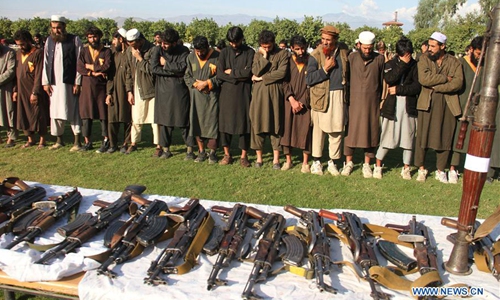HOME >> WORLD
US watchdog warns Islamic State remains operational in Syria
Source:AFP Published: 2020/2/5 18:38:43

Islamic State (IS) militants attend a surrender ceremony in Jalalabad city, capital of Nangarhar province, Afghanistan, Nov. 17, 2019. More than 600 Islamic State (IS) fighters and their families including women and children have surrendered to security forces in Achin district of eastern Afghanistan's Nangarhar province over the past two weeks amid increasing military operations, an army commander in the restive district General Mohammad Karim Niazi said. (Photo by Saifurahman Safi/Xinhua)
The Islamic State (IS) group has maintained its capabilities in Syria despite the death of its chief Abu Bakr al-Baghdadi, an independent US government watchdog said in a report on Tuesday.
An inspector general from the Department of Defense also said that a possible departure of US troops from Iraq would likely lead to a resurgence of the jihadists.
Baghdadi, 48, led IS from 2014 and was the world's most wanted man, heading a self-declared "caliphate" that once spanned parts of Iraq and Syria.
It collapsed in March after years of battle with coalition-backed forces. IS then went underground and reverted to well-honed guerrilla tactics that continued to do damage.
Baghdadi was killed in a US special forces raid in Syria's northwestern province of Idlib in late October, and the group named his replacement as Abu Ibrahim al-Hashimi al-Quraishi, about whom little was known.
In its report, the inspector general said Baghdadi's death did not affect the jihadists. Citing information from US Central Command (Centcom), which is responsible for US forces in the Middle East, the inspector general said IS "remained cohesive, with an intact command and control structure, urban clandestine networks, and an insurgent presence in much of rural Syria."
Both Centcom and the Defense Intelligence Agency concluded that Baghdadi's death "did not result in any immediate degradation to ISIS's capabilities," the report said, using another acronym for IS.
Tensions between Washington and Tehran boiled over onto Iraqi soil last month, raising fears of war that have since eased. The US killed top Iranian general Qasem Soleimani in Baghdad, and Tehran retaliated against an Iraqi base hosting US soldiers, dozens of whom were hurt.
In Iraq, US forces suspended their operations against IS after the killing of Soleimani in order to focus on protecting the roughly 5,200 American personnel in Iraq.
Posted in: MID-EAST